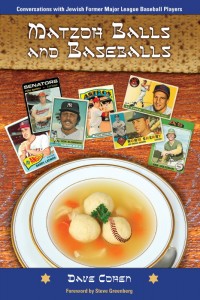Jewish Major Leaguers in Their Own Words: Oral Histories of 23 Players
Authors: Peter Ephross, Martin Abramowitz
Published: 2012
Pages: 227
Price: $35 (Amazon.com or McFarland Publishing/800-253-2187)
Our rating: 4 stars (out of 5)
Reviewed by Stuart M. Katz for Jewish Baseball News
Overview
In Jewish Major Leaguers in Their Own Words, authors Peter Ephross and Martin Abramowitz present oral histories of 23 of the Jewish players who were on Major League rosters between 1918 and 2005. Beginning with Bob Berman, who played for the Washington Senators in 1918, and ending with Adam Greenberg, who played one fateful game for the Chicago Cubs in 2005, the book provides an unusual window into America’s pastime.
What’s Jewish about it
Some interesting and common themes emerge in the book. Most of the players from the first half of the 20th century identify themselves as traditional Jews, say they experienced anti-Semitism (although not as virulent as the discrimination they saw African-American players suffer), and typically didn’t play on the High Holidays. Jews who played more recently were more likely to be from mixed marriages and less likely to take the High Holidays off.
Jesse Levis, who played for the Indians and the Brewers, recalls playing on Yom Kippur in 1996. He explains that because he wasn’t a superstar, he didn’t feel he had a choice, although he did fast that day. “I’m not Sandy Koufax…I’m a Major League player trying to make a living,” he says. As it happened, Levis didn’t get a hit that day — or for that matter, he says, the rest of the season. “God punished me anyway.” Former 1st-round draft pick Ron Blomberg recalls playing in a game in 1973 that lasted into the first night of Rosh Hashanah. “The game was tied with two outs in the bottom of the ninth inning, but we had a man on third base. I had to make the decision: quit the game for Rosh Hashanah, or get a base hit….I got a clutch base hit to win the game – the biggest hit of my career. I cherish that at-bat more than anything else in my life.”
Regardless of the era, Jewish pride resonates throughout many of the interviews. Hank Greenberg, who died in 1986, said that when a Jew hears about a gifted Jewish athlete, statesman or artist, “you take a certain pride in the fact that one of your own people (has) made good.”
My take
Although much has been written about Greenberg and Koufax, far less is known about the careers of others featured in the book, men like Sam Nahem, Cy Block and Mike Epstein. Their stories as non-superstars are no less interesting. Among the most compelling chapters are the ones devoted to Elliott Maddox and Jose J. Bautista, whose Judaism was less obvious because they are African-American and Hispanic, respectively.
The obstacles that Jewish ballplayers faced in the 20th century resembled the assimilation struggles that most American Jews faced during that era. But as these oral histories reveal, maintaining Jewish traditions remained extremely important to the players. I look forward to a future volume featuring interviews with Braun, Youkilis, Breslow, Ian Kinsler, Gabe Kapler and other more recent players. I wonder if they will describe their connection to Judaism as clearly and proudly as those who blazed the trail for them.
– – – – – – – – – – – – –
![]() Stuart M. Katz is a die-hard Yankees fan. An attorney at Cohen and Wolf in Bridgeport, Conn., he chairs the firm’s Employment & Labor Group and represents employers as well as executives.
Stuart M. Katz is a die-hard Yankees fan. An attorney at Cohen and Wolf in Bridgeport, Conn., he chairs the firm’s Employment & Labor Group and represents employers as well as executives.
# # #
Click through our link before ordering goods from Amazon.com. It’ll help keep us afloat, and it costs you nothing!











